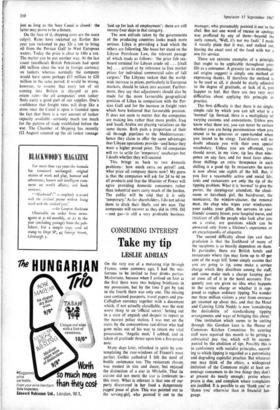Take my tip
CONSUMING INTEREST LESLIE ADRIAN
On the very eve of a motoring, trip through France, some summers ago, I had the mis- fortune to be invited to four drinks parties. Misfortune, because when I arrived on foot at the first there were two bulging briefcases in my possession, but by the time I got by taxi to the fotirth there was only one. The missing case contained passports, travel papers and pre- Callaghan currency together with a document which, if not actually classifiable, was the next worst thing to an 'official secret.' Setting out in a state of anguish and despair to report to the nearest police station, I was met on the stairs by the conscientious taxi-driver who had gone miles out of his way to return my vital possessions. 'Angelic man,' I sobbed, and in token of gratitude thrust upon him a five-pound note.
Many days later, refreshed in spirit by con- templating the rose-windows of France's most perfect Gothic cathedral I felt the need of bodily sustenance too. The restaurant chosen was modest in size and decor, but enjoyed' the distinction of a star in Michelin. That its cuisine did not merit the star is irrelevant to,- this story. What is relevant is that one of our party discovered in her food a dangerously jagged piece of glass. This was pointed out to the serving-girl, who pointed it out to the manager, who presumably pointed it out to the chef. But not one word of excuse of apology was proffered by any of them—beyond the
surly remark, 'Well, it's not my fault.' I made it vocally plain that it was, and stalked out, leaving the exact cost of the food with not a sou for service.
These are extreme examples of a principle that ought to be applicable throughout your life as a consumer. A gratuity (as its etymologi-
cal origins suggest) is simply one method of expressing thanks. If therefore the method is to be used at all, it should be nicely adjusted to the degree of gratitude, or lack of it, you happen to feel. But there are two very real difficulties about applying this principle in practice.
The first difficulty is that there is no single, simple rule by which you can tell what is a 'normal' tip. Instead, there is a multiplicity of varying customs and conventions. Unless you know what these are, you can never be certain whether you are being parsimonious when you intend to be- generous or open-handed when you intend to be stingy. Taxi-drivers will no doubt educate you with their own special vocabulary. Unless you are affronted, you should never, in my view, tip less than nine- pence on any fare, and for most fares above three shillings an extra threepence in each shilling is a good tip. In restaurants the norm is now about one eighth of the bill. But if you live a reasonably active and social life, taxis and restaurants are only the tip of the tipping problem. What it is 'normal' to give the porter, the sleeping-car attendant, the cloak- room or hat-cheek girl, the hairdresser, the manicurist, the window-cleaner, the removal man, the chap who wipes your windscreen, your caddy, your gillie, the servants in your friends' country house, your hospital nurse, and (trickiest of all) the people who look after you on a cruise, are questions which can be answered only from a lifetime's experience or an encyclopaedia of etiquette.
The second difficulty about tips and their gradation is that the livelihood of many of the recipients is so heavily dependent on them.
In particular, there are British hotels and restaurants where tips may form up to 45 per cent of the wage bill:Some simply assume that you are going to tip, some make a service charge which they distribute among the staff, and some make such a charge keeping part or even all of it in the hotel accounts. Fre- quently you are given no idea what happens to the service charge or whether it is sup- posed to replace ordinary tipping. No wonder our three million visitors a year from overseas get steamed up about this, and that the Hotel and Catering Little Neddy is now 'considering the desirability of standardising tipping arrangements and ways of bringing this about.' One institution which seems to be cutting through this Gordian knot is the House of
Commons Kitchen Committee. Its catering staff were reported this month to be getting a substantial pay rise, which will be Accom- panied by the abolition of tips. Possibly this is in conformity with socialist principles, accord- ing to which tipping is regarded as a patronising and degrading capitalist practice. But whatever one may think of the ethics, a widespread imitation of the Commons might at least en- courage consumers to do two things they don't at present do nearly enough: praise where praise is due, and complain where complaints are justified. It is possible to say 'thank you' or 'damn you' otherwise than in financial lan- guage.






























 Previous page
Previous page